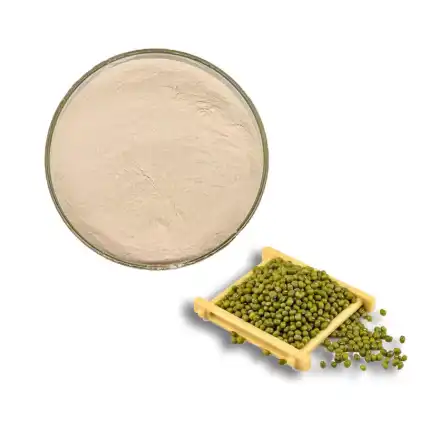Health Benefits of Mung Bean Protein Powder
Nutrient-Rich Profile
Mung bean protein powder is derived from the seeds of Vigna radiata, a legume native to India and Southeast Asia. This fine, light yellow powder boasts an impressive protein content of approximately 80%, making it a powerful plant-based protein source. In addition to its high protein concentration, mung bean protein powder is rich in essential vitamins, minerals, and antioxidants, supporting overall health. Its natural composition, digestibility, and nutrient density make it an ideal choice for vegetarians, vegans, and anyone seeking a clean, plant-based protein supplement for daily nutrition.
Digestive Health Support
One of the standout features of Mung Bean Protein Powder is its exceptional digestibility. Unlike some other plant-based proteins, mung bean protein is easily absorbed by the body, making it an excellent choice for individuals with sensitive digestive systems. The high fiber content in mung beans also promotes healthy digestion and may help maintain regular bowel movements.
Heart Health Promotion
Mung bean protein powder is associated with potential cardiovascular benefits. Studies indicate that regular consumption of mung bean protein may help reduce cholesterol levels, improve lipid profiles, and support healthy blood pressure. Its protein and bioactive compound content may contribute to overall cardiovascular protection. By promoting better arterial function and aiding in the regulation of cholesterol, mung bean protein powder supports a heart-healthy lifestyle, making it a beneficial addition to diets focused on cardiovascular wellness and long-term heart health.

Mung Bean Protein vs Other Plant Proteins
Amino Acid Profile
When comparing mung bean protein to other plant-based protein sources, its amino acid profile stands out. Mung bean protein contains all nine essential amino acids, making it a complete protein. This sets it apart from many other plant proteins that may be lacking in one or more essential amino acids. The balanced amino acid profile of mung bean protein makes it comparable to animal-based proteins in terms of nutritional value.
Allergen-Free Alternative
Mung bean protein powder is naturally free from common allergens such as soy, dairy, and wheat, making it suitable for people with food sensitivities or allergies. Its non-GMO and TSE/BSE-free characteristics further enhance its appeal as a clean and safe protein supplement. This makes mung bean protein an ideal option for individuals following restricted diets, vegan or vegetarian lifestyles, and those seeking hypoallergenic protein sources, ensuring optimal nutrition without compromising safety or dietary restrictions.
Environmental Sustainability
In an era of increasing environmental consciousness, Mung Bean Protein Powder shines as a sustainable protein option. Mung beans require fewer resources to cultivate compared to animal-based protein sources, resulting in a lower carbon footprint. By choosing mung bean protein powder, consumers can support their health goals while also contributing to environmental conservation efforts.

How Mung Bean Protein Supports Muscle Growth?
Protein Quality and Muscle Synthesis
The efficacy of mung bean protein in supporting muscle growth lies in its high-quality protein content. With a protein concentration of approximately 80%, mung bean protein powder provides ample building blocks for muscle tissue repair and growth. The complete amino acid profile ensures that the body receives all the necessary components for optimal muscle protein synthesis.
Post-Workout Recovery
Mung bean protein powder can be an excellent addition to post-workout nutrition plans. Its rapid digestibility allows for quick absorption of amino acids, facilitating faster recovery after intense exercise sessions. The protein's ability to support muscle repair and reduce muscle soreness makes it a valuable tool for athletes and fitness enthusiasts alike.
Lean Muscle Development
For individuals looking to build lean muscle mass, mung bean protein offers a low-fat, high-protein option. Unlike some animal-based proteins that may come with additional saturated fats, mung bean protein provides a clean source of muscle-building nutrients. This makes it easier for users to manage their calorie intake while still meeting their protein requirements for muscle growth and maintenance.

Conclusion
Mung bean protein powder stands out as a nutritious, versatile, and sustainable protein source that offers numerous health benefits, provided by a reliable Mung Bean Protein Powder factory. From its complete amino acid profile to its digestibility and potential cardiovascular benefits, mung bean protein proves to be an excellent choice for those seeking a plant-based protein supplement. Whether you're an athlete, fitness enthusiast, or health-conscious individual, incorporating mung bean protein into your diet can support your overall well-being and fitness goals.
At GreenHerb Biological Technology Co., Ltd., we're committed to providing high-quality mung bean protein powder to meet your nutritional needs. Our product is certified by ISO, HACCP, KOSHER, and HALAL, ensuring top-notch quality and safety. For more information or to place an order, contact us at sales@greenherbbt.com.

FAQ
How much mung bean protein should I consume daily?
The recommended daily protein intake varies depending on factors such as age, gender, weight, and activity level. Generally, adults should aim for 0.8-1 gram of protein per kilogram of body weight. For athletes or those engaged in regular intense exercise, this requirement may increase to 1.2-2 grams per kilogram. Consult with a healthcare professional or registered dietitian to determine the optimal amount for your specific needs.
Can mung bean protein powder be used in cooking?
Yes, mung bean protein powder is versatile and can be incorporated into various recipes. It can be added to smoothies, baked goods, soups, and sauces to boost their protein content. The light flavor of mung bean protein allows it to blend well with other ingredients without overpowering the taste of your dishes.
Is mung bean protein suitable for people with soy allergies?
Absolutely. Mung bean protein is an excellent alternative for individuals with soy allergies. It is naturally free from common allergens, including soy, making it a safe option for those with various food sensitivities. Always check the product label to ensure no cross-contamination has occurred during processing.

References
1. Tang, D., et al. (2019). "Mung Bean Protein: Nutritional, Functional, and Health-Promoting Attributes." Food Science and Human Wellness, 8(2), 103-109.
2. Dahiya, P.K., et al. (2015). "Mung Bean: Technological and Nutritional Potential." Critical Reviews in Food Science and Nutrition, 55(5), 670-688.
3. Yi-Shen, Z., et al. (2018). "Mung Bean Proteins and Peptides: Nutritional, Functional and Bioactive Properties." Food & Nutrition Research, 62.
4. Leterme, P. (2002). "Recommendations by Health Organizations for Pulse Consumption." British Journal of Nutrition, 88(S3), 239-242.
5. Mohanty, B., et al. (2021). "Bioactive Compounds and Antioxidant Properties of Mung Bean (Vigna radiata L.): A Review." Journal of Food Science and Technology, 58(8), 2836-2847.

